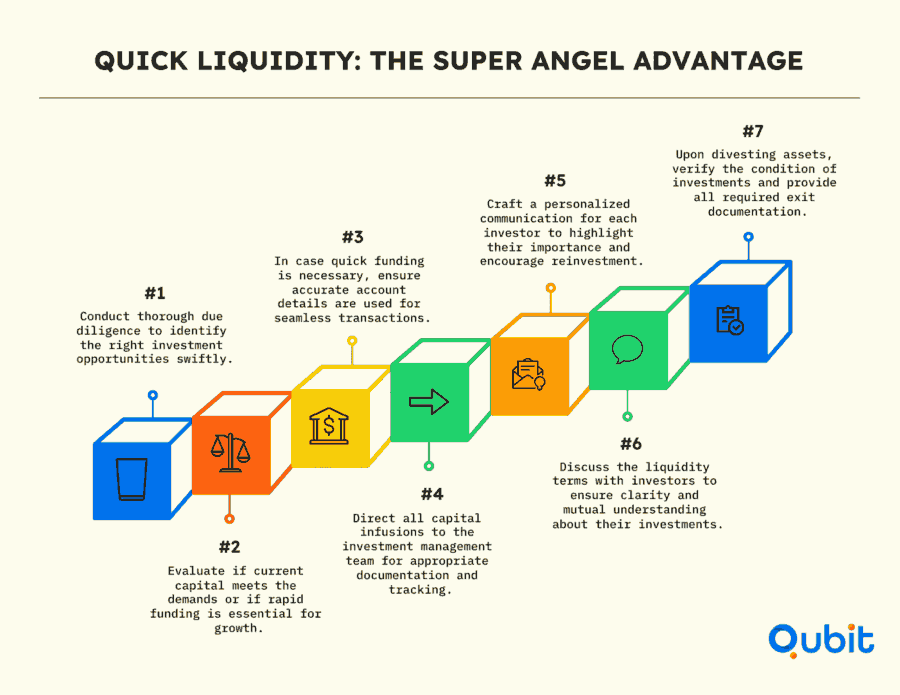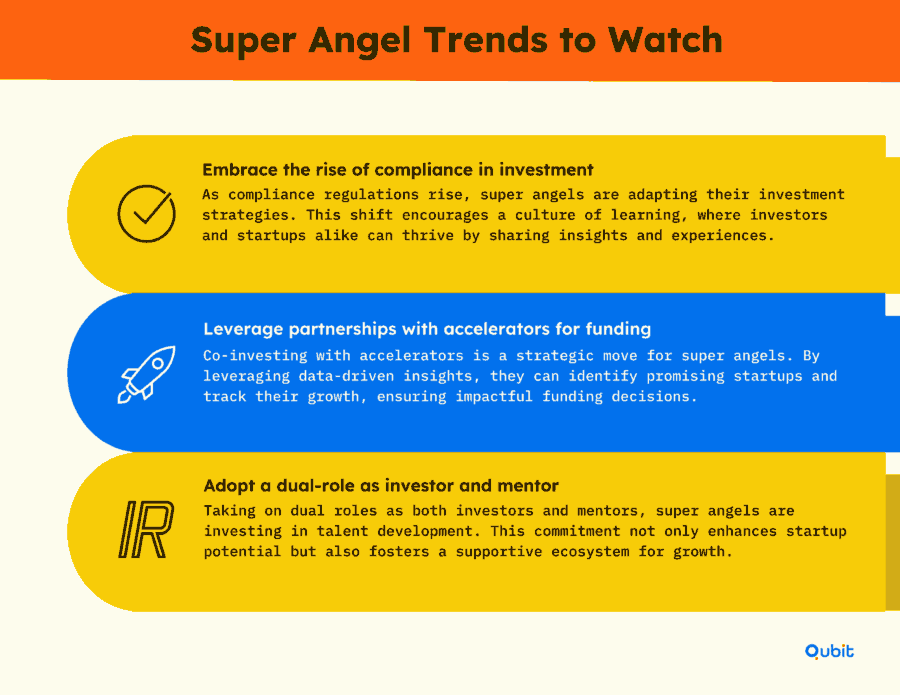Super angel investors bring more than just financial backing to the table—they offer invaluable expertise that can shape the trajectory of a startup. These seasoned investors often act as mentors, providing strategic guidance and access to their extensive networks, making them a unique asset for founders seeking more than just capital. Looking at the types of investors in startups helps make sense of what each one brings to the table, and how they fit into what a founder might actually need.
This blog explores how super angels combine their financial resources with actionable insights, helping startups achieve sustainable growth while navigating the complexities of early-stage development.
Exploring How Angel and Super Angel Investors Operate
Angel investing plays a pivotal role in fueling early-stage startups, offering entrepreneurs access to capital investors who are willing to take risks on unproven ideas. Angel investors typically use their personal funds to make smaller investments, often ranging from $25,000 to $100,000. Super angels, however, operate on a larger scale, investing between $250,000 and $500,000 per deal. This check size is a defining characteristic that sets super angels apart from standard angel investors.
While both angel and super angel investors focus on early-stage companies, their approaches differ significantly. Super angels often bring more than just capital to the table—they actively engage with startups by offering hands-on advisory support, strategic guidance, and industry connections. This involvement can accelerate growth and improve a startup’s chances of success.
In contrast, venture capital investors manage institutional funds rather than personal wealth. Their investment cycles are typically longer, with a focus on scaling businesses to achieve substantial returns over time. Unlike super angels, venture capitalists often invest in later-stage companies that have already demonstrated market traction.
Super angels provide unique advantages, including faster decision-making and a more personalized approach to mentorship. Their ability to invest larger sums while maintaining close relationships with founders makes them invaluable partners for startups aiming to scale quickly.
What You Need to Know About Super Angel Investment Cycles and Key Deals
Super angel investors are reshaping the startup ecosystem with their ability to accelerate growth and liquidity. Unlike traditional venture capital investors, who often operate on extended timelines of 8–12 years, super angels focus on rapid exit cycles, typically achieving results in four years or less. This expedited approach not only benefits founders but also creates opportunities for reinvestment, fueling innovation at an unprecedented pace.
How Super Angels Drive Quick Liquidity

Super angels stand out for their ability to conduct swift due diligence and negotiate deals efficiently. Their large check sizes and strategic involvement enable startups to scale quickly, often leading to faster exits. This trend of "quick exits" empowers super angels to reinvest their capital more frequently, fostering a cycle of continuous growth and innovation. For founders, partnering with super angels means accessing liquidity much sooner, a significant advantage compared to traditional venture capital timelines.
Case Studies: Ben Zises and Maples
Prominent super angels like Ben Zises and Maples exemplify the transformative impact of this investment model. Ben Zises has built a diversified portfolio by investing in 30 companies, showcasing how super angels can rapidly identify and support high-potential startups. Similarly, Maples has played a pivotal role in early-stage tech breakthroughs, investing in key firms that have gone on to achieve remarkable success. These examples highlight the strategic foresight and agility that define super angel investors.
Comparing Super Angels and Micro VCs
While micro VCs focus on seed-stage deals, super angels operate with a broader scope, often targeting startups with the potential for rapid exits. Insights into alternative early-stage financing are expanded in micro vcs and super angels, revealing how specialized investors can influence your venture's funding strategy. This comparison underscores the unique advantages of super angels in driving accelerated growth and liquidity.
Super angel investors are redefining the landscape of startup funding, offering founders a faster path to success. Their ability to combine large investments with quick exits makes them a powerful force in the venture capital ecosystem.
The Pros and Cons of Angel and Super Angel Funding
Angel and super angel funding can be a game-changer for startups, offering unique benefits alongside notable challenges. These capital investors provide early-stage funding, often coupled with mentorship and access to niche networks, which can accelerate growth. However, startups must weigh the risks carefully to make informed decisions.
Advantages of Angel and Super Angel Funding
Angel investors bring more than just financial support. Their experience and connections can open doors to industry-specific networks, helping startups gain traction faster. Key benefits include:
- Portfolio Diversification: Angel investors often spread their investments across multiple startups, reducing risk while supporting innovation.
- Direct Mentorship: Many angels actively guide founders, offering insights that can refine business strategies and improve operational efficiency.
- Agile Decision-Making: Unlike traditional venture capital firms, angels can act quickly, providing funds without lengthy approval processes.
Challenges Startups Should Consider
While angel funding has its perks, it’s not without drawbacks. Startups must navigate potential risks such as:
- High Failure Rates: Early-stage investments are inherently risky, with many startups failing to deliver returns.
- Diluted Equity: Accepting angel funding often means giving up a significant portion of equity, which can impact long-term control.
- Investor Overreach: Some angels may become overly involved in decision-making, potentially clashing with founders’ visions.
The Professionalization of Angel Networks
A growing trend in angel investing is the professionalization of angel networks. These networks are increasingly adopting venture capital-like processes, enhancing collaboration and co-investments among super angels. This shift aligns their operations more closely with traditional VC practices, offering startups a more structured approach to funding.
For startups exploring alternative funding sources, nuances of public financial support are examined in government-backed investment programs startups, providing you with context on how state initiatives supplement private funding.
How to Strengthen Angel Relationships and Improve Your Fundraising Strategy
Building strong relationships with angel investors is crucial for simplifying your fundraising process and ensuring long-term success. By focusing on streamlined investor management, transparent communication, and balanced equity distribution, startups can create a foundation for effective collaboration with both angel and super angel investors.
1. Limit the Number of Investors
Managing a smaller group of investors can significantly reduce decision-making complexity. A concentrated investor pool allows for quicker resolutions and minimizes conflicting opinions, enabling your startup to stay agile. This approach is particularly beneficial when dealing with super angel investors, who often bring substantial capital and expertise to the table.
2. Prioritize Transparent Communication
Clear and consistent communication fosters trust and keeps investors aligned with your vision. Regular updates on financial performance, milestones, and challenges ensure that investors remain engaged and supportive. Transparency also helps avoid misunderstandings and strengthens the overall relationship, making it easier to secure future funding rounds.
3. Balance Equity with Advisory Roles
Equity distribution should reflect the value each investor brings to your startup. While financial contributions are important, advisory roles can be equally impactful. Striking a balance between equity allocation and advisory involvement ensures that investors feel valued while your startup benefits from their expertise.
For startups considering sovereign investments, parallels can be drawn between regulatory intricacies for sovereign and super angel investors. An analysis of regulatory challenges is presented in legal issues with sovereign investments, which helps you understand the legal framework associated with such funding.
Stay Ahead with Trends and Expert Tips in Angel and Super Angel Investing
Angel investing continues to evolve, with super angels reshaping the landscape by combining substantial capital investments with hands-on mentorship. Experts emphasize that super angels are not just financial backers; they actively drive startup growth through agile decision-making and strategic guidance. This dual role positions them as pivotal players in the early-stage funding ecosystem.

Emerging trends highlight the importance of compliance in angel investing. Regulatory frameworks are becoming increasingly stringent, requiring investors to adopt robust measures to ensure adherence. This focus on compliance safeguards both investors and startups, fostering a transparent and secure investment environment.
Accelerator programs are another key component in optimizing early-stage funding. Platforms like Seedcamp, renowned for their structured growth initiatives, provide angel-backed startups with the resources and mentorship needed to scale effectively. Similarly, 500 Startups exemplifies how super angels can co-invest alongside venture capital investors to amplify reach and impact.
These case studies demonstrate how strategic capital infusion can shape startup trajectories, providing lessons applicable to super angel-backed ventures. By staying attuned to these trends and expert insights, investors can position themselves to make informed decisions that drive innovation and growth in the startup ecosystem.
Build Strong Relationships and a Strategic Plan for Angel Investing
Establishing a robust framework for angel investing requires more than capital—it demands strategic planning and meaningful relationships. From the initial pitch to post-investment collaboration, every step plays a critical role in ensuring success. Angel investors often begin by networking with founders, attending pitch events, and evaluating opportunities. These interactions set the stage for deeper due diligence, where investors assess the startup’s financials, market potential, and team capabilities.
Super angels, known for their data-driven and agile approach, bring added value to this process. Their ability to analyze trends and act swiftly makes them indispensable for startups seeking growth. However, the relationship doesn’t end with the investment. Long-term collaboration is vital for follow-on funding and sustained development. By maintaining open communication and aligning on strategic goals, angel investors and founders can foster mutual trust and drive innovation.
These large-scale capital sources offer unique opportunities to support emerging businesses, highlighting the diverse strategies available in the investment ecosystem.
Ultimately, successful angel investing hinges on a streamlined process and the ability to cultivate lasting partnerships. By prioritizing both, investors can maximize their impact while supporting the next wave of entrepreneurial success.
Conclusion
Securing funding for your startup requires a strategic approach, and understanding the nuances between angel investors, super angels, and venture capitalists is crucial. Each offers distinct advantages, from rapid exit cycles to varying levels of involvement in your business. Clear, data-driven engagement with investors can significantly enhance your chances of success, ensuring alignment with their expectations and goals.
Combining capital with expertise is often the key to accelerated growth. Investors who bring industry knowledge and mentorship alongside funding can help startups overcome challenges and scale effectively. At Qubit Capital, we specialize in connecting startups with super angels who provide both substantial capital injections and invaluable guidance.
If you're ready to transform your funding journey, explore our Fundraising Assistance service. Let us help you secure the resources and expertise needed to propel your startup forward. Get in touch today!
Key Takeaways
Super angels provide a unique advantage by combining significant capital with hands-on strategic support, often enabling faster exit opportunities for startups ready to scale quickly.
Navigating today’s funding landscape requires a solid grasp of the differences between investor types—from traditional angels to super angels, micro VCs, and institutional funds—to tailor outreach and pitch strategies effectively.
Consistent, transparent communication and the cultivation of well-managed investor relationships are essential not only for initial funding success but also for long-term partnership and growth.
Implementing actionable strategies grounded in regulatory compliance and operational best practices helps mitigate risks and builds investor confidence throughout the fundraising process.
Accessing expert insights, whether through advisors, platforms, or investor networks, can streamline the funding journey, reduce delays, and help optimize critical aspects of startup development.
Frequently asked Questions
How to connect with angel investors?
To connect with angel investors, founders should actively attend pitch events, startup competitions, and demo days where early-stage investors often scout for opportunities. Additionally, joining accelerator programs and using online investment platforms like AngelList or SeedInvest can provide direct access to angel networks. Personalized outreach, strong referrals, and warm introductions also significantly improve your chances of securing interest and building meaningful connections.


 Back
Back



